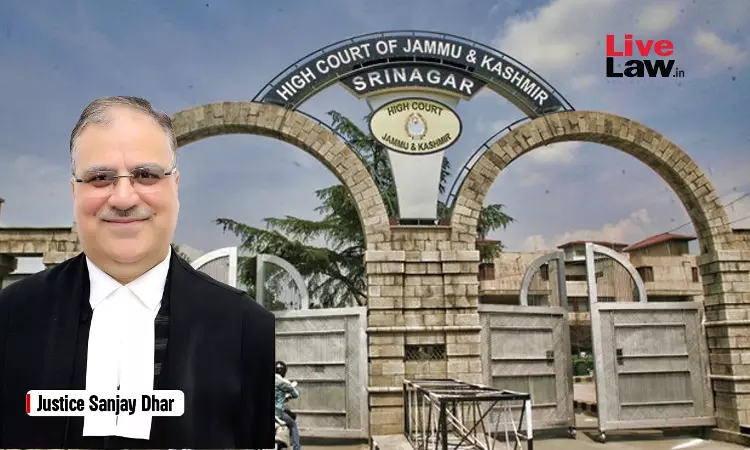- Home
- /
- High Courts
- /
- High Court of J & K and Ladakh
- /
- Breach Of Fiduciary Trust By...
Breach Of Fiduciary Trust By Manager Cannot Be Taken Lightly: J&K High Court Denies Bail in ₹71 Lakh Embezzlement Case
LIVELAW NEWS NETWORK
29 May 2025 10:00 AM IST
Taking strong exception to the alleged abuse of fiduciary trust, the High Court of Jammu & Kashmir and Ladakh has refused to grant anticipatory bail to a petrol pump manager accused of defrauding his employer of over ₹71 lakh.Justice Sanjay Dhar observed that when a manager, taking advantage of the trust reposed in him by his employer, proceeds to commit breach of such trust, the...
Taking strong exception to the alleged abuse of fiduciary trust, the High Court of Jammu & Kashmir and Ladakh has refused to grant anticipatory bail to a petrol pump manager accused of defrauding his employer of over ₹71 lakh.
Justice Sanjay Dhar observed that when a manager, taking advantage of the trust reposed in him by his employer, proceeds to commit breach of such trust, the offence assumes grave dimensions and cannot be taken lightly. He further remarked that the allegations against the petitioner fall within the category of “economic offences” and warrant serious judicial scrutiny rather than leniency.
“.. the grant of protection to the accused in serious cases may lead to miscarriage of justice and may hamper the investigation to a great extent as it may sometimes lead to tampering or distraction of the evidence”, Justice Dhar underscored.
Background of the Case:
The case arose from a complaint lodged by one Rubeena Iqbal, proprietor of Lidder Valley Filling Station at Mattan, Anantnag. She had engaged the petitioner as manager of her petrol pump and entrusted him with complete control over day-to-day operations, sale records, bank transactions, and accounts.
It was alleged that the petitioner regularly shared updates on sales, expenses, and deposits through WhatsApp, including purported bank statements. However, at the end of the financial year 2024, a glaring mismatch came to light during reconciliation. Where the records showed over ₹1.5 crore as bank balance and several lakhs as cash in hand, the actual bank balance was only ₹86.25 lakh.
Upon inquiry, it was discovered that the bank statements shared by the petitioner were forged. Furthermore, it was alleged that the petitioner had destroyed critical accounting records and day books up to May 2024. According to a Chartered Accountant's report submitted by the complainant, petitioner had embezzled approximately ₹71.33 lakh.
Subsequently the FIR for offences under Sections 318(4), 336(3), 340(2), 338 and 316 of the Bharatiya Nyaya Sanhita (BNSS) came to be registered.
Seeking anticipatory bail the petitioner through Advocate Aswad Attar contended that he was falsely implicated and claimed the discrepancies were minimal, amounting to around ₹9 lakh, and not attributable to him. He further argued that he had cooperated with the investigation while on interim anticipatory bail granted by the Additional Sessions Judge. However, his bail was later denied once forgery allegations surfaced in the police report.
Opposing the petition, Senior Advocate Jahangir Iqbal Ganai, appearing for the complainant, and Government Advocate Mr. Ilyas Laway argued that custodial interrogation was essential to unearth the full extent of the fraud. They highlighted the seriousness of the offence and the volume of funds allegedly siphoned off by the petitioner.
Court's Observations:
Justice Dhar, while dismissing the bail application, engaged in an extensive analysis of precedents governing anticipatory bail. Referring to landmark judgments like Gurbaksh Singh Sibbia v. State of Punjab, Siddharam Satlingappa Mhetre v. State of Maharashtra, and Sushila Aggarwal v. State (NCT of Delhi), the Court reiterated that economic offences deserve stricter scrutiny and custodial interrogation may be necessary for effective investigation.
The Court observed that the petitioner, in his managerial role, had access to and control over all financial dealings of the petrol pump. The allegations of forging bank statements and destroying financial records indicated a well-planned and serious economic offence,the court pointed and added,
“It cannot be stated that the charge levelled against the petitioner is false or illusory... The nature of allegations made against the petitioner is serious as he is alleged to have siphoned off more than ₹71 lakh... If the petitioner is admitted to anticipatory bail, it is definitely going to impact further investigation in an adverse manner.”
The bench further warned that admitting the petitioner to anticipatory bail could hinder recovery of the embezzled funds and frustrate the aims of justice. The Court also cited the Supreme Court's ruling in Directorate of Enforcement vs. Ashok Kumar Jain and Srikant Upadhyay v. State of Bihar, underlining that economic offences stand on a different footing and anticipatory bail should not be granted as a matter of routine.
With the investigation still underway and the exact magnitude of the fraud yet to be determined, the High Court refused to grant anticipatory bail. “The recovery of the amount alleged to have been embezzled by the petitioner is yet to be effected and if the petitioner is admitted to bail, the recovery of the said amount may not be possible without his arrest and custodial interrogation”, the court concluded.
APPEARANCES:
For Petitioner: Mr. Aswad R. Attar, Advocate
For Respondents: Mr. Ilyas Laway, GA. Mr. Jahangir Iqbal Ganai, Sr. Advocate, with Ms. Mehnaz Rather & Khursheed Ahmad Dar, Advocates-for complainant.
Case Title: Adil Hamid Wani Vs UT Of J&K
Citation: 2025 LiveLaw (JKL) 208



